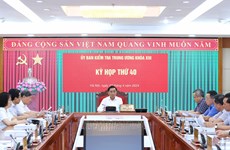Vietnam, ASEAN pledge to share G20’s efforts
PM Nguyen Tan Dung pledged to share and support
efforts made by G-20 to cope with challenges to the global
economy at a meeting prior to the G20 summit in Toronto on June 26
of local time.
Prime Minister Nguyen Tan Dung of Vietnam pledged to share and support efforts made by G-20 to cope with immediate challenges to the global economy at a meeting prior to the G20 summit held in Toronto on June 26 of Canada time.
Dung made the statement also in the capacity of the Chairman of the Association of Southeast Asian Nations (ASEAN).
He said the challenges, including budget deficits, public debts and inflation, should be addressed in order to ensure the global economy to continue rebounding and avoid the relapse into financial chaos in several economies that might lead to global economic crisis.
Dung, however, reminded participating economies of long-term challenges to regions or the world such as poverty, gaps of development, climate changes and food and energy insecurity.
These problems should be taken care of to ensure sustainable development and balance the global economy on a large scale, he emphasised.
He reported that at a summit held in Hanoi on April 8-9, ASEAN reached a view to continue with monetary and fiscal support but prepare to lift supportive measures whenever the individual economy signals steady growth.
ASEAN leaders were also committed to following sustainable development, strengthening social security networks, speeding up educational and training cooperation, upholding the private economic sector’s role, protecting the environment and narrowing the gap of development among the ASEAN.
The meeting between Vietnamese Prime Minister Dung and G-20 leaders took place following a welcome ceremony chaired by Canadian Prime Minister Stephan Harper in honour of head delegates to a summit of the Group of Twenty.
The participants were of a view that since early this year, the global economy has shown signs of steady rally which was much better than expected. They attributed the achievement to economic stimulus packages and reforms efforts made by a number of nations.
They however acknowledged that the progress has run in unequal pace among different economies and region.
Developed economies such as the US, Europe and Japan have picked up relatively slow. Meanwhile developing and emerging economies, especially Asia such as China, India and the ASEAN, have steadily grown up, playing a role as an important momentum for the global economic recovery./.
Dung made the statement also in the capacity of the Chairman of the Association of Southeast Asian Nations (ASEAN).
He said the challenges, including budget deficits, public debts and inflation, should be addressed in order to ensure the global economy to continue rebounding and avoid the relapse into financial chaos in several economies that might lead to global economic crisis.
Dung, however, reminded participating economies of long-term challenges to regions or the world such as poverty, gaps of development, climate changes and food and energy insecurity.
These problems should be taken care of to ensure sustainable development and balance the global economy on a large scale, he emphasised.
He reported that at a summit held in Hanoi on April 8-9, ASEAN reached a view to continue with monetary and fiscal support but prepare to lift supportive measures whenever the individual economy signals steady growth.
ASEAN leaders were also committed to following sustainable development, strengthening social security networks, speeding up educational and training cooperation, upholding the private economic sector’s role, protecting the environment and narrowing the gap of development among the ASEAN.
The meeting between Vietnamese Prime Minister Dung and G-20 leaders took place following a welcome ceremony chaired by Canadian Prime Minister Stephan Harper in honour of head delegates to a summit of the Group of Twenty.
The participants were of a view that since early this year, the global economy has shown signs of steady rally which was much better than expected. They attributed the achievement to economic stimulus packages and reforms efforts made by a number of nations.
They however acknowledged that the progress has run in unequal pace among different economies and region.
Developed economies such as the US, Europe and Japan have picked up relatively slow. Meanwhile developing and emerging economies, especially Asia such as China, India and the ASEAN, have steadily grown up, playing a role as an important momentum for the global economic recovery./.













